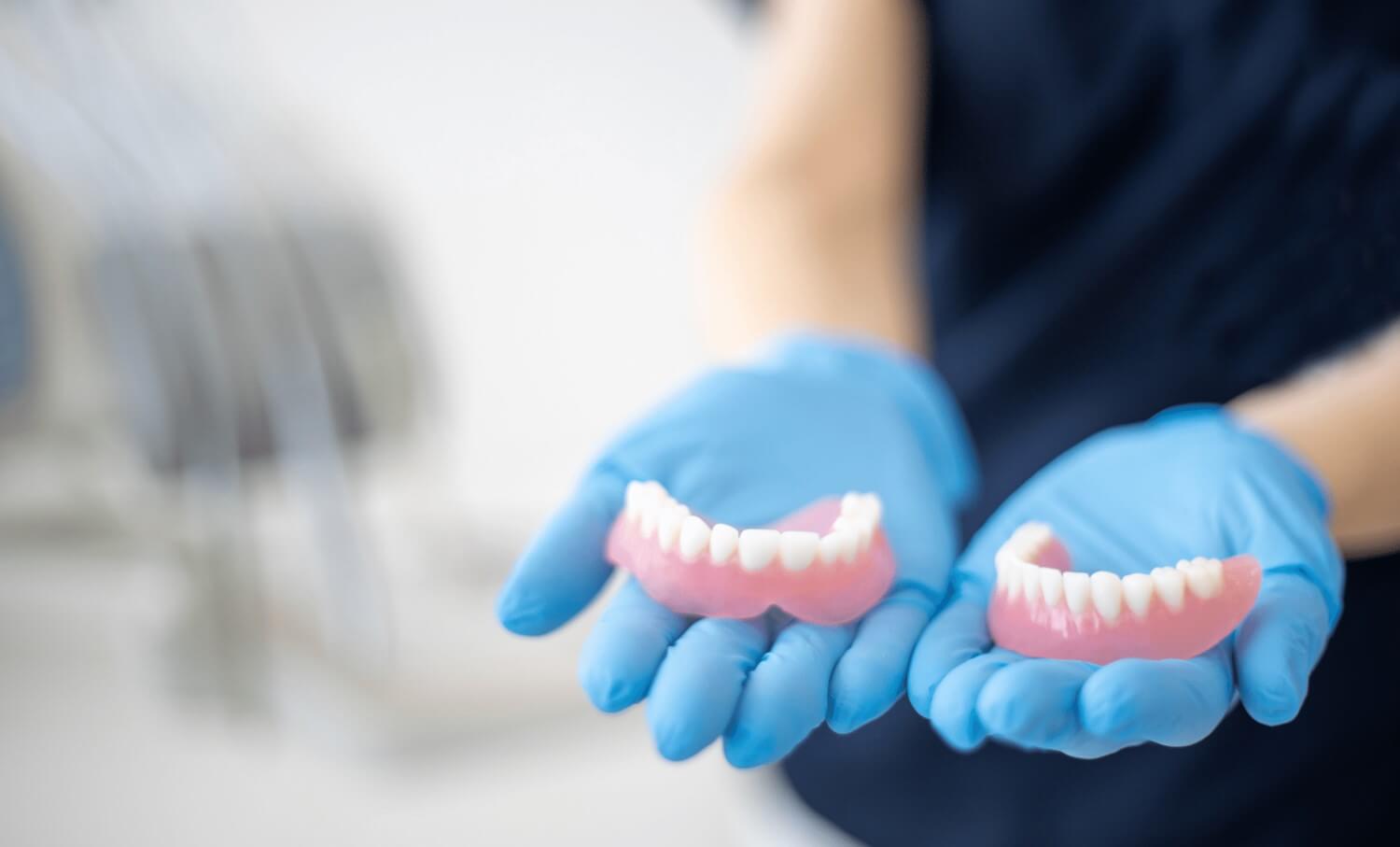Types of dentures
Complete, or sometimes called full dentures, replace all of the teeth, while removable partial dentures fill in the spaces created by teeth that have been removed, and prevent other teeth from changing position.
Candidates for full dentures have lost most or all of their teeth, while partial dentures are suitable for those who have some of their natural teeth remaining. A denture can help improve chewing ability and speech and provide support for facial muscles. Dentures can also significantly enhance facial appearance and smile.
Complete or full dentures are used when all of your natural teeth are missing. Full dentures can be made for upper or lower jaws or both.


Complete dentures are sometimes referred to as conventional or immediate, according to when they are made and when they are inserted into the mouth. Immediate dentures are inserted soon after the removal of the teeth. To make this possible, our denturist takes measurements and makes models of the patient’s jaws during a preliminary visit.
An advantage of immediate dentures is that during the healing period the wearer does not have to be without teeth. However, during the period of healing in the first six months after the removal of teeth, the bones and gums can shrink over time. When gums shrink, immediate dentures may require adjusting or relining to fit properly. Conventional dentures can then be made once the tissues have healed.
Adjustments
Dentures may need adjusting over time. As you age, your mouth naturally changes. This can affect the fit of the dentures. Your bone and gum ridges may recede or shrink, resulting in a loosening of the dentures fit. Loose dentures can lead to the development of sores or infections.
Dentures that do not fit properly can be adjusted by either of our denturists, John or Youni. Avoid using a do-it-yourself kit to adjust your dentures. This can damage them beyond repair. You should also avoid using glues not recommended by us, as they often contain chemicals harmful to dentures.
If your dentures begin to fit improperly, if there are cracks, breaks, or chips, or if any of the teeth become loose, call us immediately. In many cases, we can make necessary adjustments or repairs, often on the same day, because we have our own in-house dental lab. Complicated repairs may require a little extra time.
Over time, dentures will need to be relined or re-made due to normal wear. Eventually, dentures will need to be replaced when showing signs of significant wear.
Types of dentures
Complete, or sometimes called full dentures, replace all of the teeth, while removable partial dentures fill in the spaces created by teeth that have been removed, and prevent other teeth from changing position.
Candidates for full dentures have lost most or all of their teeth, while partial dentures are suitable for those who have some of their natural teeth remaining. A denture can help improve chewing ability and speech and provide support for facial muscles. Dentures can also significantly enhance facial appearance and smile.
Complete or full dentures are used when all of your natural teeth are missing. Full dentures can be made for upper or lower jaws or both. Complete dentures are sometimes referred to as conventional or immediate, according to when they are made and when they are inserted into the mouth. Immediate dentures are inserted soon after the removal of the teeth. To make this possible, our denturist takes measurements and makes models of the patient’s jaws during a preliminary visit.
An advantage of immediate dentures is that during the healing period the wearer does not have to be without teeth. However, during the period of healing in the first six months after the removal of teeth, the bones and gums can shrink over time. When gums shrink, immediate dentures may require adjusting or relining to fit properly. Conventional dentures can then be made once the tissues have healed.
Adjustments
Dentures may need adjusting over time. As you age, your mouth naturally changes. This can affect the fit of the dentures. Your bone and gum ridges may recede or shrink, resulting in a loosening of the dentures fit. Loose dentures can lead to the development of sores or infections.
Dentures that do not fit properly can be adjusted by either of our denturists, John or Youni. Avoid using a do-it-yourself kit to adjust your dentures. This can damage them beyond repair. You should also avoid using glues not recommended by us, as they often contain chemicals harmful to dentures.
If your dentures begin to fit improperly, if there are cracks, breaks, or chips, or if any of the teeth become loose, call us immediately. In many cases, we can make necessary adjustments or repairs, often on the same day, because we have our own in-house dental lab. Complicated repairs may require a little extra time.
Over time, dentures will need to be relined or re-made due to normal wear. Eventually, dentures will need to be replaced when showing signs of significant wear.
